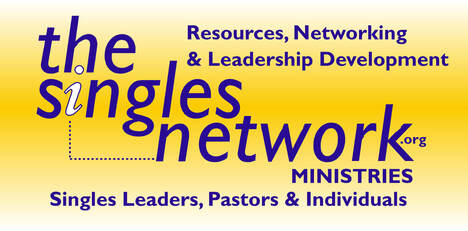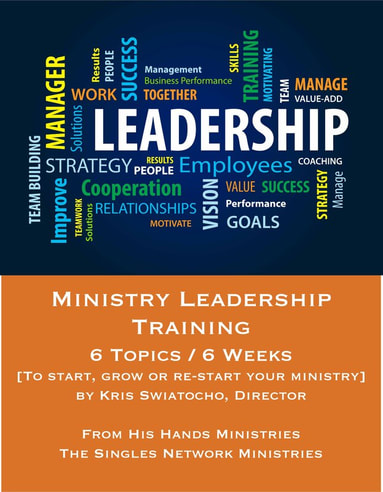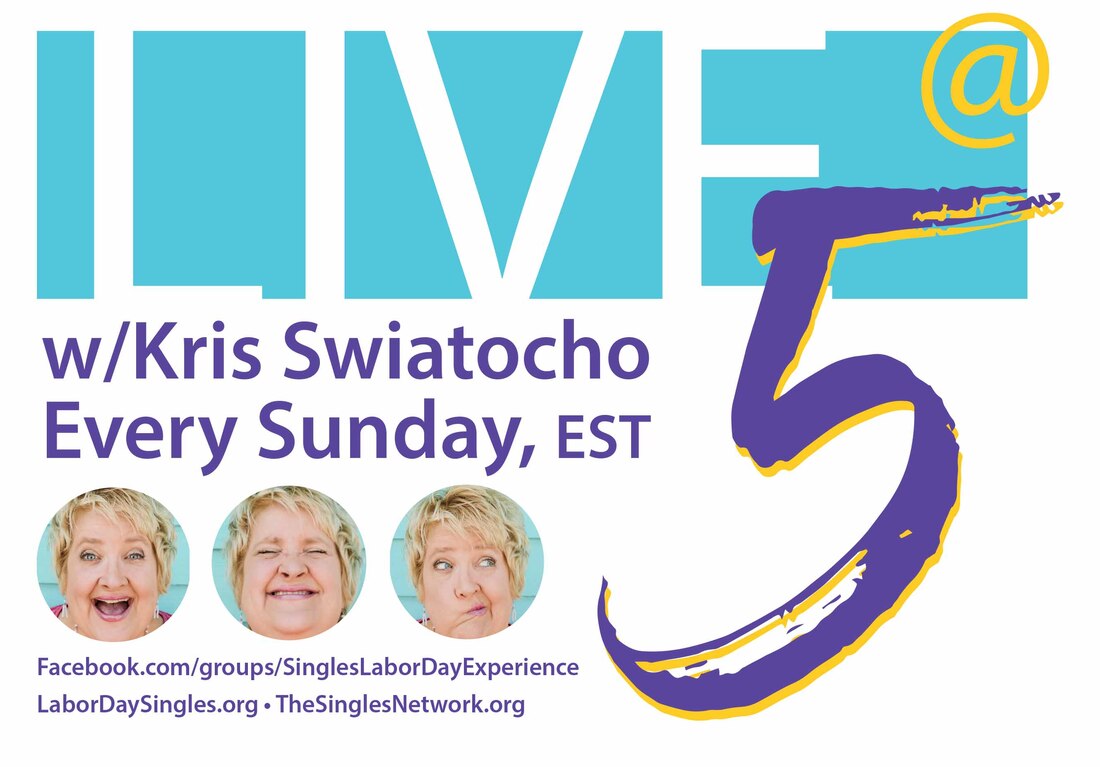Articles: Building your Singles Ministry by Kris Swiatocho, Director
Jesus, Single Like Me: He Built His House on Solid Groundby Kris Swiatocho
It was 2 a.m., and I was scrunched down in my hall bathroom with nothing to keep me company but my dog, a black Cocker Spaniel named Joshua, and a battery-operated radio. I kept switching back and forth to the various stations, trying to find out where the storm was. The power had gone out hours before, and panic was beginning to set in.
It was September 5, 1996, and Hurricane Fran was just about to hit my hometown of Garner, NC (a suburb of Raleigh). As I fought with the radio, my dog needed to go out again. I was reluctant to let him out but knew I preferred not to have him go in my small bathroom. I lit another candle and slowly opened the front door to let him out. Everything was pitch-black. The wind sounded horrible, and there was an uneasiness in the air. I yelled for Joshua to return, and in seconds, a very wet dog ran back inside. We quickly walked back into my bathroom and laid on the mattress I had put on the floor. This would be a long, hot night, waiting for the storm to pass and praying my house would still be standing. Had it been built right? Had it been built on solid ground? Could it withstand the storm ahead? Only God knew the answers. I have often used this story as I have led single adult ministry. Our ministries need to be started on solid ground. So many times, we get ahead of God, wanting to have a ministry for singles to have something fun to do. Sure, we know we need Bible study and prayer, but some things get pushed toward the bottom of the list. In Matthew 7:21-29 Jesus tells us the importance of building not only our ministries on solid ground, but ourselves as well. "Not everyone who says to me, ‘Lord, Lord,’ will enter the kingdom of heaven, but only those who do the will of my Father who is in heaven. Many will say to me on that day, ‘Lord, Lord, did we not prophesy in your name and in your name drive out demons and in your name perform many miracles? 'Then I will tell them plainly, ‘I never knew you. Away from me, you evildoers!' Therefore everyone who hears these words of mine and puts them into practice is like a wise man who built his house on the rock. The rain came down, the streams rose, and the winds blew and beat against that house; yet it did not fall, because it had its foundation on the rock. But everyone who hears these words of mine and does not put them into practice is like a foolish man who built his house on sand. The rain came down, the streams rose, and the winds blew and beat against that house, and it fell with a great crash." When Jesus had finished saying these things, the crowds were amazed at his teaching, because he taught as one who had authority, and not as their teachers of the law (Matt. 7:21-29). Jesus, Single Like Me, Taught: 1. Not everyone will enter the kingdom because they cry out to God. As Christians, it's easy to say that we are good people and love God. We go to church, read our Bibles, and say “Bless you” when somebody sneezes. Jesus tells us not everyone who calls out to God will enter the kingdom of heaven but only those doing the will of God. The devil believes, goes to church, and knows the Bible better than you or I, but he is not going to heaven. Our relationship must be more than just lip service and fitting in with those beside you. It's more than just putting "Christian" on your Facebook page. It's how you are living your life. It's your walk, day in and day out. It's how you love others due to your relationship with Christ. It's how you spend your money, time, and energy. It's your attitude. Are you building God's kingdom or your own? Are you seeing growth in your relationship with God? Has your salvation made a change in your life? A change that not only changes you but helps you to lead others to that change as well? So I tell you this, and insist on it in the Lord, that you must no longer live as the Gentiles do, in the futility of their thinking (Eph. 4:17). "But seek first his kingdom and his righteousness, and all these things will be given to you as well" (Matt. 6:33). Since, then, you have been raised with Christ, set your hearts on things above, where Christ is seated at the right hand of God (Col. 3:1). 2. To enter into heaven, actions led by God must be followed by our faith. There are so many folks out there who live a mediocre life in Christ. They are like zombies in the world. They do the same thing every day, working hard for the paycheck only to end their day in exhaustion and emptiness. Christ came to give us life in abundance. This abundance is a life with passion and purpose. Out of our relationship with Christ, there should easily be a desire to serve the Lord, but it must be in HIS WILL. So many people serve the Lord out of obligation. I am a member of this church, so I guess I should sign up to teach kids, serve food, etc. What? How boring is that! As you seek God with all your might and strength, I promise he will give you direction. He will help you find the passion that comes from purpose. He will guide you to serve in a way that brings joy to our heavenly Father and you and those around you. As you find your place in God's will for your life, it will spread to others to seek theirs. Don't just believe in God, but follow in HIS way. Do not merely listen to the word, and so deceive yourselves. Do what it says (James 1:22). The works of his hands are faithful and just; all his precepts are trustworthy (Ps. 111:7). Very truly I tell you, all who have faith in me will do the works I have been doing, and they will do even greater things than these, because I am going to the Father (John 14:12). 3. These principles apply to our ministries, too. As a ministry, Jesus tells us many will say, "we" did this, and "we" did that in your name. Lord, we built this ministry and fed homeless people, raised money for this mission trip, visited people in nursing homes, and so on. But again, lost people feed the hungry, raise money, and visit folks in nursing homes. When you say you do these things in HIS name but aren't living it yourself, it means nothing to Jesus. He will simply tell you he never knew you. So many so-called ministries raise funds to help orphans but keep most of the money for themselves. Even on a smaller scale, do we give God our leftovers or our best? Are we serving out of humility from grace or because it looks good to others? As we lead our ministries, we must teach others the importance of serving God. That not all ministry is genuinely led by God. “Bring the best of the first-fruits of your soil to the house of the LORD your God" (Ex. 23:19). Do your best to present yourself to God as one approved, a worker who does not need to be ashamed and who correctly handles the word of truth (2 Tim. 2:15). Therefore if you have any encouragement from being united with Christ, if any comfort from his love, if any common sharing in the Spirit, if any tenderness and compassion, then make my joy complete by being like-minded, having the same love, being one in spirit and of one mind. Do nothing out of selfish ambition or vain conceit. Rather, in humility value others above yourselves, not looking to your own interests but each of you to the interests of others (Phil. 2:1-4). 4. Before I can do anything in His will, I (we) must listen: a. I have to be quiet. I can't tell you how many times I have lost direction in the ministry God has given me due to not being quiet enough to hear God. The Lord teaches us the importance of being quiet to hear God speak. We are so distracted by so many things. From our sin (and that of others) to people pulling us to do this or that, to the personal needs of others to over-commitment. How can you even begin to listen when the noise overwhelms you? But whoever listens to me will live in safety and be at ease, without fear of harm (Prov. 1:33). "Now then, my children, listen to me; blessed are those who keep my ways" (Prov. 8:32). b. I have to make it something I practice daily. How can I know what God wants from me if I don't listen daily? This means a consistent time with God where you are reading his Word and allowing time for the Holy Spirit to give you direction. It's personal time with God so you can pray for others, yourself, and your ministry. Out of this quietness comes the peace and strength we need from God. “Teach me, and I will be quiet; show me where I have been wrong" (Job 6:24). The fruit of that righteousness will be peace; its effect will be quietness and confidence forever (Isa. 32:17). c. Be ready to do what God asks. God gives us direction all day. We don't move on this action because we sometimes don't like what he is telling us to do. There are times I know God wants me to share with this person, deal with this conflict, etc. I know this is only to help me grow, but I will sometimes avoid listening to God. But I realize his way is also best. His way leads to victory. His way leads to peace. His way leads to wisdom. You can never have too much wisdom. Again and again I sent all my servants the prophets to you. They said, “Each of you must turn from your wicked ways and reform your actions; do not follow other gods to serve them. Then you will live in the land I have given to you and your ancestors.” But you have not paid attention or listened to me (Jer. 35:15). Note: Leaders, it’s essential that we continue to model this to our teams. We need to hold folks accountable for their own time with God. Ask the hard questions, encourage them to be consistent, seek help from a counselor as needed, etc. We want our teams to grow, and it has to start with them as individuals. As we grow personally, it affects the whole team. So Christ himself gave the apostles, the prophets, the evangelists, the pastors, and teachers to equip his people for works of service so that the body of Christ may be built up until we all reach unity in the faith and in the knowledge of the Son of God and become mature, attaining to the whole measure of the fullness of Christ (Eph. 4:11-13). 5. As we build our lives and ministries on a solid foundation, we can handle anything thrown our way. When your relationship (foundation) is built based on God's direction, you are built on solid rock. Like a house, our ministries must be started with the right foundation. So many singles ministries are started backward. We want the events and fun things to do. We want the large numbers. However, we don't want to do the work to get there. For example, in your walk, you have gotten to where you are step by step. Our ministries are the same. We must go the speed God wants, slowly building a solid foundation of prayer, leadership development, and communication. The stronger the foundation, the better chance of continued success. So there I was with my dog, listening to the wind howl and the rain pound on the roof. All I could do was pray. I knew my house was built well. I knew I had done what I needed to secure items on my deck from blowing away or crashing into my home. I knew I had bought the necessary food and water supplies. But would it be enough? Would the preparations I had done save my house? Well, morning finally came, and to my surprise, my house had withstood the storm. I had one tree that had toppled over away from my home. I will find out later that weeping willows have short root systems, making them easy targets for storms. However, as I walked throughout my neighborhood, I noticed some of my neighbors’ homes were in bad shape. Some had trees and cars falling through their roofs. Some had windows blown out. I quickly ran home and grabbed some supplies to help my neighbors. The whole neighborhood came out to help each other. Even though some of our home foundations weren't as strong as others, we still came together to help each other. So even in our walks and our ministries, we must come alongside to help each other grow and build the right foundation for a passionate, purposeful relationship with the Lord so that when the storms come, we can withstand them. Kris Swiatocho is the Director of The Singles Network Ministries and Kris Swiatocho Ministries. She has been in leadership for over 30 years, helping countless churches to start and grow their ministry. She is the author of several books, including the leadership curriculum. • www.TheSinglesNetwork.org • www.KrisSwiatochoMinistries.org • www.LaborDaySingles.org • www.IntentionalRelationshipSolutions.org Jesus, Single Like Me: He Was a Content Leader (and single)by Kris Swiatocho
What creates contentment?
Is it our age? Marital status? Career? Material possessions? A satisfying meal or a great find at a thrift store? Our relationship with Christ? Is it finally giving our kids, our parents, and those people in our lives that we know need the Lord over to the Lord? Is it waving the white flag in complete surrender to Jesus, giving up on being God and trying to control everything, and, as a result, total peace? A peace that says, I am OK the way I am, where I am with what I am. You have finally learned contentment isn’t Jesus plus a spouse, Jesus plus my dream home or job, and Jesus plus kids. It’s just Jesus. Well, this all sounds wonderful, doesn’t it? And I thought I was there many years ago. I even wrote about it for the former SAM Journal 25 years ago. While I had gone through many things personally and professionally at that point, I had not lived long enough to under what true contentment was. I am not saying that some don’t figure it out at a young age. I believe Jesus is our perfect example of living a life of contentment. However, for most of us, it takes much longer. In my Jesus Single Like Me study, I wrote about eight different aspects of Jesus, his singleness, and how it relates to our singleness. In Chapter 1, I wrote about Jesus having a purpose that would not include marriage and kids. He would also end up working out of His known skilled set of carpentry, going into full-time ministry. We know Jesus had family and discipleship drama, people who overly needed Him, and people who attacked and betrayed Him and ultimately killed Him. Being content has nothing to do with what you would like your life to be; it has more to do with the peace of the life God gave you. Because I am not Jesus, I needed more time and life experiences to understand true contentment. I turned to Paul, a single adult sold out for Jesus. I learned from his example of what true commitment is. What can we learn from Paul and his contentment? What do we learn from this scripture of Philippians 4:10-20 ? Paul is writing to the believers in Philippi, Greece, while in prison in Rome. We know Paul loves to teach and train, share, encourage, convict, and affirm people in his writings and person. In some of this correspondence, he has asked for help—provision as a missionary to do the work God has called him to do. While he has found contentment—knowing God has got him, he still lets people know of his needs and affirms their behavior in those who ask. Philippians 4:10 I rejoiced greatly in the Lord that at last you renewed your concern for me. Indeed, you were concerned, but you had no opportunity to show it. Paul affirmed their interest in his welfare. This is not only a lesson that we need to be interested and concerned for those on the mission field, but as someone on the mission field, I need to thank God for those who care about and support me. This is a way God teaches us that he is going to provide. When we are fearful of our finances, of a place to live, work, etc., it affects our contentment. When we believe the lies from the enemy, it keeps us distracted. Paul has been here before and knows God will take care of him. If you keep trying to take control of your life, if your goals don’t align with God, there is no peace, as “our way” is inconsistent and has many highs and lows. With Jesus, he keeps us in perfect peace—like a calm lake when we truly trust in him. This peace provides contentment. Philippians 4:11-13 I am not saying this because I am in need, for I have learned to be content whatever the circumstances. I know what it is to be in need, and I know what it is to have plenty. I have learned the secret of being content in any and every situation, whether well fed or hungry, whether living in plenty or in want. I can do all this through him who gives me strength. Paul is not saying—oh because I have found contentment in my life, I don’t have needs, including financial and emotional support, prayer, etc. He is simply saying that if some churches, some people don’t want to give or are not able to give, or even are at a place of giving, it’s OK because God will take care of him. That true contentment is not in his marital or financial status but in Christ. This contentment is from his strength in the Lord. Hmm, so what does strength in the Lord have to do with contentment? Well, it takes courage, trust, and confidence in Jesus to be in a place where you are OK, whatever the circumstance. Even though it’s tough, and there are times when you might not be sure if you will have a job tomorrow, be married, or even see those you love come to the Lord, God is still good, and He is still enough. Don’t forget that the enemy will make you feel that you do not have enough, that you deserve more, and that you must accumulate it as if you can take it with you. Don’t make your goals of having more or better stuff a reality; make it your goal to win people to Jesus. Philippians 4:14Yet it was good of you to share in my troubles. Paul affirms the proper behavior of these believers. Despite Paul being content with where he is in life, he still has troubles. And he is teaching us the importance of sharing those troubles with others. Jesus designed us for the community, not to live this life alone and isolated. The enemy loves to get us by ourselves. Paul’s contentment was directly related to having people in his life. How is your community? How is your involvement in church? How are you serving the Lord? How is your attitude? Are you spending more time complaining about what you don’t have instead of thanking God for what you do have? Get busy in the ministry of Jesus and see how your life can change, and you can have that contentment you desire. Philippians 4:15-16 Moreover, as you Philippians know, in the early days of your acquaintance with the gospel, when I set out from Macedonia, not one church shared with me in the matter of giving and receiving, except you only; for even when I was in Thessalonica, you sent me aid more than once when I was in need. God can provide more than what we need. I love that it wasn’t about what they gave but exceeded Paul’s expectations. Knowing God has you in the way HE DESIRES leads to contentment. I know that if God wants me to minister to this church, that group of people, that city, that town, etc., he will provide what is needed there. How do I know this? Because I have lived it, like Paul. I have seen God show up not only in my life but also in the lives of others. I have seen miracles. Why wouldn’t God care for those who are His arms and legs, mouthpiece, and heart? The key here is provision for God’s purposes, not mine. This means that sometimes you must put back that new outfit, those knick-knacks at the thrift store, or a new car and be sure what you are buying is to advance HIS kingdom and not yours. Each time you are obedient to God, each time you are serving Him, you are worshipping Him. Job 36:11 says, “If they obey and serve him, they will spend the rest of their days in prosperity and their years in contentment. Don’t let the enemy provide what you need; let God do it. Philippians 4:17-20 Not that I desire your gifts; what I desire is that more be credited to your account. I have received full payment and have more than enough. I am amply supplied, now that I have received from Epaphroditus the gifts you sent. They are a fragrant offering, an acceptable sacrifice, pleasing to God. And my God will meet all your needs according to the riches of his glory in Christ Jesus. To our God and Father be glory for ever and ever. Amen. Paul continues to remind them of what is essential to obtain being content. When we give or receive in Jesus’ name, it smells beautiful because Jesus provides it through His provision and timing. When we know all that we have, give, and receive is by and through the Lord, anxiety disappears, and the peace from contentment takes its place. The enemy will do his best to make your giving stressful and fearful. Trust the Lord today with everything you have. While I am finally at a place of true contentment overall, changing my prayer life to what I desire, minus an occasional trip to a thrift store, I am not content in my walk with God. I want more of Him. I want more of His time and knowledge. I want to gain more wisdom and truth. I want to see through His eyes. I want to know within seconds the right direction to go. I want to feel more empathy and love for others. I want to give up more for Him. I don’t want to become those Luke-warm Christians who sit on the back pew (or only attend online), saying they have done their part to serve God. As long as my body breathes, I want to grow closer to God. Kris Swiatocho is the Director of The Singles Network Ministries and Kris Swiatocho Ministries. She has been in leadership for over 30 years, helping countless churches to start and grow their ministry. She is the author of several books, including the leadership curriculum. • www.TheSinglesNetwork.org • www.KrisSwiatochoMinistries.org • www.LaborDaySingles.org • www.IntentionalRelationshipSolutions.org |
COG National Conference, Orlando, FlLeadership SnippitLeaders That Last Curriculum• Leaders that Last is 6 weeks, 6 topics Curriculum:
The first 3 weeks that are inward focus towards personal development and last 3 weeks that are outward focus towards building and unifying the team. • Leaders that Last Curriculum includes: A trainers guide with additional questions, icebreaker ideas, small group discussion, and weekly assignments, etc. plus participants outline. • Leaders that Last Curriculum is a: Microsoft word document so you can alter to fit your specific group whether young adult, single adult or single parent, divorced or widowed. WEEKLY TOPICS: Week 1: Who You Are in Christ Week 2: Affirming Your Calling as a Leader Week 3: Spiritual Warfare Week 4: Mentoring/Finding others with a Similar Calling Week 5: Building the Team Week 6: Caring for the Team. Week 1: Who Am I? Description: Everything starts and ends with a great team but a team starts with a great leader. A great leader should know who they are in Christ first in order to lead others. This leader also should have a personal, growing relationship with Christ. This lesson will focus on your identity, your personal growth in your faith, and your walk with the Lord. Week 2: Who Ya Going to Call? Description: Learning and affirming your calling to be a leader. Most maturing Christians are serving the Lord but often in the wrong area, this lesson will help you focus on the right area God is calling you into. Week 3: The Devil Made Me Do It! Description: This lesson focuses on how to recognize the enemy’s attacks on you, your team, and your ministry, and what to do when it does happen. Week 4: Making Copies! Description: This lesson focuses on the importance of recognizing potential leaders by starting with those who are voluntold versus volunteers. Week 5: There’s No “I” in Team Description: Everything falls and rises on leadership. Without a great team that is unified in the path to reach the goals God has put in place, leadership will fail. This lesson will focus on how to build a team that builds the ministry. Week 6: Are You a Care Bear? Description: This lesson focuses on how to keep our team, our leaders, and, ultimately, our ministry going and growing. Leadership Articles by Kris SwiatochoAdditional resources by Kris and other authors, click here.
Kris holds a singles retreat every September up in the mountains and I’ve attended the last 8 years. The 3rd year, Sept 2017 I came for the leadership portion of the meeting and was inspired by the teaching, many years of experience working with singles, messages shared, stories from other church leaders and resources galore at the meeting and on the website. I left that weekend fired up and it sparked me to start a singles focused bible study at our church which has been running a year now and doing great... I have so many stories I could share... many new visitors/members... connecting with singles in the church that weren’t plugged in.. networking with other Christian groups and churches... things just continue to spiral... we held a singles NYE celebration a few weeks ago. The owner of The Barn Dance (non-alcoholic club) that some of us go to often came. His club was only open on sat night BUT... he was inspired by the number we had at our dance and the amazing community... he had no idea that singles have that much of a need/want to be together. SO tonight he hosted his first Christian Singles Dance Party at The Barn Dance and it was a big hit. Planning to do a monthly dance there.—opening with prayer and ending with praise songs and prayer. I can’t wait to see what God has for us in 2024. Also very excited about this years Singles Retreat! Find info on thesinglesnetwork.org and come join us Thanks Kris for all you do... for your heart for God and singles. |
|
© 2024 The Singles Network Ministries
638 Spartanburg Hwy Ste 70-113 Hendersonville, NC 28792 • 919.434.3611 [email protected] Designed by Yes! Marketing & Design Services |
Would you be willing to help by giving us a donation? Every penny makes a difference.
|



















